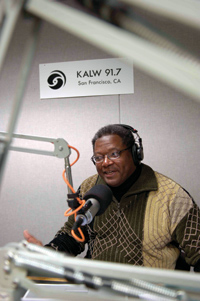|
||
      |
Peer Review ::
The philosopher’s zone
Stanford philosophy professor Ken Taylor brings reason to radio.

Taylor dishes out deep thoughts to lunchtime listeners at San Francisco’s
KALW 91.7 FM.
“A lot of people in radio hate the name,” says Ken Taylor, PhD’84, Stanford’s philosophy chair and cohost of public-radio show Philosophy Talk. “They think anything with the word ‘philosophy’ in it connotes boredom—two philosophers droning on.” Yet every Tuesday at noon, Bay Area listeners tune in to San Francisco’s KALW, 91.7 FM, for a dose of bookish banter. Past topics include the language of politics, the metaphysics of suicide, and heavy hitters such as Hegel, Kant, and Schopenhauer. The show’s guest list reads like a Who’s Who of public intellectuals: Harvard law professor Alan Dershowitz tackled terrorism, Berkeley’s John Searle mused on the mystery of the mind, and Princeton’s Peter Singer got into global poverty and international aid. Chicago professors also show up: Martha Nussbaum, the Ernst Freund distinguished service professor of law and ethics, has been a repeat visitor.
“We don’t want to bastardize philosophy,” says Taylor. “We want to do real philosophy.” But meaningful dialogue can be a tall order in a medium that thrives on 30-second sound bites: “Once somebody said to us that the problem with our show is that people have to actually listen to it,” Taylor says with a laugh from his Palo Alto office. “Is that a criticism?”
Criticism or not, people are listening. Since its first broadcast on KALW in August 2003, Philosophy Talk has been picked up by more than a dozen West Coast stations and has more than 30,000 weekly listeners. Taylor and his cohost, fellow Stanford philosophy professor John Perry, also have presented live episodes for the American Philosophical Association and Oregon Public Broadcasting television audiences, and are hitting the road again in July for discussions at the Smithsonian and on Capitol Hill. Their core audience: reflective people desperate for substance. “There are millions,” says Taylor, “who despise the media because it’s often so cheap and shallow. We’re trying to be a counterweight to that.”
Digging deep started out a tough sell. Perry, whom Taylor describes as possessing “a neurotic need to educate and entertain the world,” conceived the show in 1992 but couldn’t find anyone “crazy enough” to do it with him until his future cohost joined the department in 1995. When Taylor, Perry, and their then-producer took an in-house pilot to the 2000 Public Radio Conference in Seattle, they got plenty of cold shoulders. “You might think that public radio is a space of innovation and risk-taking,” says Taylor, “but it’s a very staid, conservative world.” Still, he concedes the initial excursion—they were radio novices with no station backing—was a “completely ballsy” move. Eventually they got a bite from independent San Francisco producer Ben Manilla, who agreed to listen to their demo. “Don’t play this for anybody else,” he advised the duo at a follow-up lunch meeting. “You’re not ready for prime time, but there’s promise here.”
With Manilla on board, the trio created two more pilots with better sound quality and editing and peddled the show around the Bay Area. After public-radio giant KQED passed, smaller talk station KALW picked it up. Now nearing the end of its third season, the Philosophy Talk crew is looking to market nationally. (Non–West Coasters can download episodes at www.philosophytalk.org.)
Meanwhile the philosophers continue to hone their radio personae—“We’ve gotten much better, much looser,” says Taylor—and their ruminations. Few subjects are considered too complex to tackle. Take the March 14 “What is Number?” episode, when Princeton philosophy professor Gideon Rosen pondered whether numbers exist beyond the human mind. It’s a “purely abstract, philosophical question with no real-world implication,” notes Taylor, who was not sure whether listeners would take to it. They did. An October 2005 show on quantum mechanics, a “highly technical matter,” also had the hosts concerned. “You might have thought that show would have gone over like a lead balloon,” says Taylor, “but it was really compelling,” thanks to careful planning and guest University of Arizona professor Jenann Ismael. Call-in questions from “literate and thoughtful” Bay Area listeners further strengthen each episode.
While department colleagues are enthusiastic about the show, Taylor suspects most would not trade places with him. On average he spends three to four hours reading materials for each show, plus weekly preproduction meetings, rehearsals, and tapings. “It definitely adds to my burdens,” says the philosophy of language scholar, who juggles department-chair responsibilities with a forthcoming book titled Toward a Natural History of Normativity. The “big, complicated project” discusses how human beings are “norm-mongering creatures” who use standards of language, ethics, and logic to govern their lives. It’s sure to produce more fodder for the show, helping it live up to its tagline as “the program that questions everything—except your intelligence.”